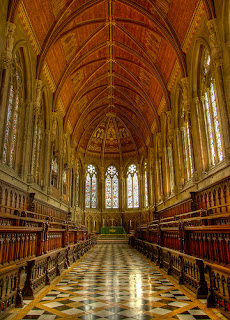i have been reading
the second book of moses, the book of exodus as the days approach pascha. this morning was chilling. i read chapter seven, which tells of the first sign, the turning of the waters of the nile into blood. i of course am reminded of the first sign of our lord, who turned the water of cana into wine. i know where this is headed, and am amazed every time by the parallels of the exodus with john's gospel. next friday, as the firstborn of the king of egypt is killed, we will read in the gospel according to john of the killing of the firstborn of god by the sons of aaron. chilling stuff. then on sunday i will read the fifteenth chapter,
the song of miriam, and it will be part of the mass as well.
the psalms of the morning were 79, 80, and 81. psalm 81 pretty much tells the story of all of us, the egyptians, the first israel, and the second israel, the church, as well:
Psalm 81. Exultate Deo.
SING we merrily unto God our strength; * make a cheerful noise unto the God of Jacob.
Take the psalm, bring hither the tabret, * the merry harp with the lute.
Blow up the trumpet in the new moon, * even in the time appointed, and upon our solemn feast-day.
For this was made a statute for Israel, * and a law of the God of Jacob.
This he ordained in Joseph for a testimony, * when he came out of the land of Egypt, and had heard a strange language.
I eased his shoulder from the burden, * and his hands were delivered from making the pots.
Thou calledst upon me in troubles, and I delivered thee; * and heard thee what time as the storm fell upon thee.
I proved thee also * at the waters of strife.
Hear, O my people; and I will assure thee, O Israel, * if thou wilt hearken unto me,
There shall no strange god be in thee, * neither shalt thou worship any other god.
I am the LORD thy God, who brought thee out of the land of Egypt: * open thy mouth wide, and I shall fill it.
But my people would not hear my voice; * and Israel would not obey me;
So I gave them up unto their own hearts' lusts, * and let them follow their own imaginations.
O that my people would have hearkened unto me! * for if Israel had walked in my ways,
I should soon have put down their enemies, * and turned my hand against their adversaries.
The haters of the LORD should have submitted themselves unto him; * but their time should have endured for ever.
I would have fed them also with the finest wheatflour; * and with honey out of the stony rock would I have satisfied thee.
i only wish i did not have such a large selection of children we are killing now, putting their blood in our gas tanks, selling their "governments" and them weapons, glutting our bellies and our cars with grain while they starve. this nigerian child came on the first row of pictures of such children on google:
lord, have mercy upon us, and incline our hearts to keep thy law.










































